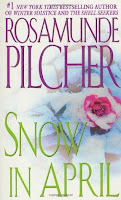 |
| (Amazon UK link) |
The opening chapter introduces Caroline, a young woman who is due to get married in a week’s time. She lives in London with her well-off and organised stepmother Diana, and Diana’s husband Shaun. Caroline likes them both very much, but has felt a bit over-protected by Diana. And, perhaps, a bit manipulated. The person she cares about most is her 11-year-old brother Jody. But he is supposed to be going to Canada with Diana and Shaun, who are moving there for a few years.
However, Jody does not want to go to Canada. Instead, he wants to find their older brother Angus. Angus has been travelling around the far East, but Jody has evidence that he is now working in Scotland. Caroline is rather persuadable - though she has a stubborn streak too - so they borrow a friend’s car and set off. Without letting anyone know in advance, without giving details of their address, and without checking with Angus whether this is okay…
It’s a long journey, and the weather gets worse and worse. The borrowed car does not have snow tyres, or even working heating, so when Caroline and Jody encounter a blizzard, the journey turns into a nightmare. Inevitably they get stuck. A light in the distance leads them to Oliver Cairney, a young man who is on his own in a large house which belonged to his brother. Oliver has just lost his brother in a horrible accident, so taking in two almost frozen young people and warming them through is quite a good distraction for him…
It’s Rosamunde Pilcher, so there are one or two coincidences in the book; it’s something I have come to expect in her novels, and I don’t have a problem with it. Oliver and his family are known to someone who is friends with Caroline’s stepmother. But although this is obvious to the reader, it isn’t to any of the characters until rather later in the book.
The writing is good, something I also expect with Pilcher’s novels. Some of the conversations are a tad stilted, even trite at times as people discuss what they are going to eat. The main characters are the upper middle classes of the era. This was first published in 1972, so even those without much money expect to have at least a cook or daily help. They all seem to drink a great deal, and smoke too. But although these things jar a little, they’re no doubt part of the author’s own culture, and appropriate for the novel.
A thread running through the book is Caroline’s lack of hunger and occasional stomach pains. Oddly enough the eventual resolution of this is something I had remembered from previous reading, as soon as it was mentioned, even though it was initially put down to pre-wedding nerves. I had remembered the romantic outcome too, though not how it happened, nor what transpired with Angus.
It’s not a long book, and I read it in a couple of hours, almost in one sitting. I became completely involved in the story line and the people. Pilcher’s greatest gift in her novels was for characterisation, and that’s what caught me up, and what makes it such a good book. Not only Caroline but even the minor characters feel realistic and three-dimensional. There are no villains in most of Pilcher’s novels; the worst we find are slightly jealous girlfriends, or somewhat materialistic businessmen, or grumpy receptionists.
Highly recommended if you enjoy character-based women’s fiction. This book is sometimes available as part of an omnibus edition with two of Rosamunde Pilcher's other shorter novels, and that may be better value than buying this on its own.
Review copyright 2019 Sue's Book Reviews
No comments:
Post a Comment